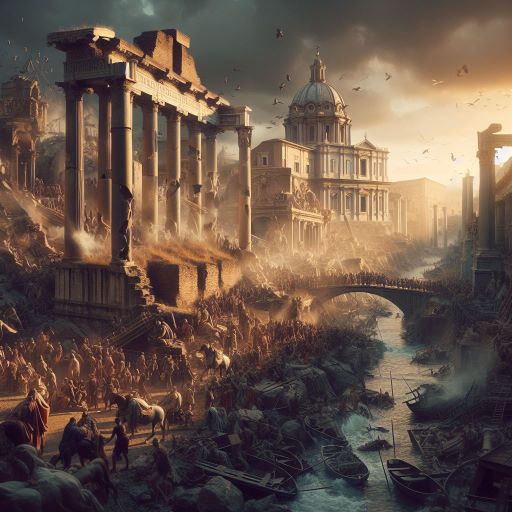In the Shadow of Rome: America’s Struggle for Survival in a Changing World
Ah, the rise and fall of empires—the stuff of legends, history books, and Hollywood blockbusters. Few empires have captured the imagination quite like Rome. From its humble beginnings as a small settlement on the banks of the Tiber River to its status as the epicenter of one of the most influential civilizations in history, Rome’s journey is captivating and cautionary.
But what led to the fall of Rome? And could there be parallels between the challenges that hastened Rome’s decline and those facing modern America? Delving into the annals of history, we uncover not just a narrative of emperors and legions but also timeless lessons about power, hubris, and the resilience of civilizations. Let’s journey through the ages, exploring the echoes of Rome’s demise and pondering its implications for the present day.
Overextension and Military Strain
At the height of its power, the Roman Empire stretched across vast expanses of territory, encompassing diverse regions and peoples under its rule. Yet, this territorial expansion came at a cost. The need to defend and administer such an extensive domain greatly strained Rome’s military and logistical capabilities. Legions were deployed far from the heartland for extended periods, stretching supply lines and draining resources. Furthermore, the constant need for conquest to sustain the empire’s growth became a self-perpetuating cycle, with each new conquest leading to additional territories to defend and administer.
Similarly, in modern America, maintaining a global military presence and fulfilling international commitments presents its own set of challenges. The United States operates military bases in over 70 countries worldwide, conducting operations and interventions across multiple theaters. The costs associated with maintaining such a formidable military apparatus are staggering regarding financial resources and human capital. Moreover, the prolonged engagements in regions like the Middle East and Central Asia have strained the military’s capacity and led to questions about the sustainability of such expansive commitments.
Furthermore, overreliance on military solutions to complex geopolitical problems can divert attention and resources from pressing domestic issues. Investments in education, healthcare, infrastructure, and social welfare may take a backseat to defense spending, exacerbating inequalities and weakening the social fabric. Thus, the lessons of Rome’s overextension serve as a cautionary tale for modern America, reminding us of the perils of stretching our military too thin and neglecting the needs of our own citizens in the pursuit of global dominance.
Economic Decline and Inequality in Rome
As the Roman Empire expanded, its economic system evolved to support the needs of a burgeoning empire. However, this growth was not without its pitfalls. The reliance on slave labor while providing a cheap and abundant agricultural and industrial production workforce stifled innovation and productivity. The concentration of wealth and resources in the hands of the elite aristocracy created a stark divide between the opulent lifestyles of the wealthy few and the poverty endured by the majority of the population.
Similarly, we grapple with growing economic inequality and stagnation in modern America. The gap between the wealthiest individuals and the rest of society continues to widen, with the top 1% amassing unprecedented levels of wealth. At the same time, many Americans struggle to make ends meet. This concentration of economic power undermines social cohesion. It hampers overall economic growth by limiting consumer spending and investment opportunities for the broader population.
Moreover, the erosion of the middle class, once the backbone of the American economy, further exacerbates these inequalities. Declining wages, job insecurity, and rising costs of essential goods and services have left many families financially precarious, unable to build wealth or plan for the future. The COVID-19 pandemic laid bare these disparities, disproportionately impacting marginalized communities and exposing the fragility of our economic system.
Given these challenges, addressing economic inequality and promoting inclusive growth must be central to any strategy for securing America’s future prosperity. By investing in education, healthcare, infrastructure, and social welfare programs, we can ensure that all Americans have the opportunity to thrive and contribute to the nation’s success. Otherwise, the lessons of Rome’s economic decline are a stark warning of the consequences of unchecked inequality and unsustainable growth.
Political Instability and Corruption in Rome
The decline of the Roman Empire was not solely attributable to external threats or economic woes; it was also marked by pervasive political instability and rampant corruption within the ruling class. As the empire expanded and centralized power in the hands of emperors, the once vibrant republican institutions of Rome deteriorated, giving way to autocracy and oligarchy. Succession crises, power struggles, and court intrigue became commonplace, undermining the stability and effectiveness of the government.
In modern America, political corruption and dysfunction concerns are all too familiar. The influence of money in politics, fueled by powerful special interests and corporate lobbyists, has eroded public trust in democratic institutions. The revolving door between government and industry perpetuates a system of cronyism and favoritism, where the interests of the few outweigh the needs of the many. Furthermore, partisan gridlock and ideological polarization have paralyzed Congress, preventing meaningful legislation from being passed and exacerbating societal divisions.
The parallels between the political turmoil of ancient Rome and the challenges facing modern America are striking. Both societies grapple with the corrosive effects of corruption, the erosion of democratic norms, and the concentration of power in the hands of the few. However, history also teaches us that political change is possible and that the resilience of democratic institutions depends on the vigilance and engagement of an informed citizenry.
By holding our elected officials accountable, demanding transparency and accountability in government, and actively participating in the democratic process, we can help safeguard the principles of liberty, justice, and equality upon which America was founded. The lessons of Rome’s political decline serve as a sobering reminder of the fragility of democracy and the importance of preserving it for future generations.
Conclusion
Reflecting on the lessons of Rome’s fall, we find cautionary tales and reasons for hope. While the parallels between ancient Rome and modern America are striking, they need not be prophetic. By learning from past mistakes and addressing our society’s systemic challenges, we can chart a course toward a more equitable and sustainable future.
The fall of Rome reminds us that empires rise and fall, but civilizations endure. By embracing the values of democracy, justice, and inclusion and actively working to uphold them, we can ensure that the American experiment continues to thrive for generations to come. So, let us heed the lessons of history, confront the challenges of today with courage and determination, and build a brighter tomorrow for all.
Check out more great articles here!
Read more on the fall of Rome here.
*If you enjoy this article, please give us a like below or share it on social media. It really helps the blog. 😊






Leave a Reply